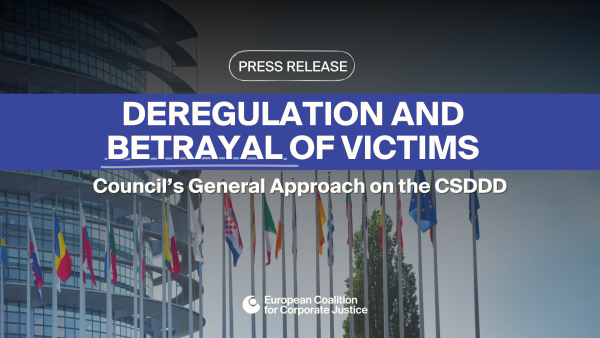This website uses cookies so that we can provide you with the best user experience possible. Cookie information is stored in your browser and performs functions such as recognising you when you return to our website and helping our team to understand which sections of the website you find most interesting and useful.

Brussels, 24 June 2025 — Yesterday, EU Member State ambassadors in COREPER II reached a General Approach on the Corporate Sustainability Due Diligence Directive (CSDDD). This agreement gives the incoming Danish Council presidency a formal mandate to negotiate in trilogue with Parliament and Commission.
The text marks a sharp and alarming departure from the ambition and purpose the CSDDD was originally built upon, dramatically watering down key obligations on climate action, environmental protection, and respecting human rights.

In particular, the General Approach proposes:
- Requesting companies to put the focus of their due diligence on first-tier suppliers, even though risks are more likely to arise further down the supply chain. In practice, big companies would not be required to address severe human rights abuse at the lower end of their supply chains — such as Uyghur forced labour in the automobile sector, or forced and child labour in the garment industry – unless prompted so by additional information provided by third parties.
- Drastically weakening obligations related to climate transition plans hollowing out one of the directive’s few tools to ensure corporate action on climate.
- Raising the company size threshold to 5,000 employees, further cutting the number of companies in scope by more than 70%. According to SOMO’s CSDDD Datahub, this cut would mean the CSDDD would only apply to 997 companies – knowing the CSDDD currently only applies to about 3300 companies which amount roughly to 0,05 % of EU businesses
- Giving Member States discretion whether or not their courts must apply the CSDDD’s standards in cross-border civil liability cases, which might lead to a diverse legal landscape within the single market to the detriment of both, victims and businesses.
Deregulation for unclear purposes
Back in February, the Commission presented the Omnibus proposal as a boost for competitiveness. Since then, over 90 prominent economists from the EU have warned that the Omnibus I proposal represents a significant setback for the EU’s economy, turning a blind eye to the need to render value chains more resilient and sustainable.
At the cost of victims and stakeholders
The General Approach leaves victims to navigate fragmented, complex national legal systems that are ill-suited for transnational cases. By focusing due diligence on tier 1, workers and other stakeholders are deliberately sidelined from engaging companies on risk identification before harm occurs.


A process which raises concerns for the rule of law and democratic law making
From the beginning, the Omnibus package process constituted an alarming departure from democratic lawmaking and rule of law principles. The European Ombudsperson has already started a formal investigation into the Commission’s Omnibus proposal —following NGO complaints alleging procedural violations including absent consultations and impact assessments.
Much is at stake
This overall deregulation sweep represents a battle between the many—workers, communities, future generations, responsible businesses—and the few benefiting from the status quo. Europe must prioritise sustainability, resilience of supply chains and climate action.
We urge the Council to correct course in trilogue negotiations: restore democratic integrity, maintain strong human rights and environmental protections, reinforce climate obligations, ensure real access to remedy for victims, and reject false trade-offs between sustainability and competitiveness.
We also call on the European Parliament to swiftly adopt its position: uphold the CSDDD ambition on sustainability and accountability, and enter trilogues ready to defend strong mandatory human rights and environmental due diligence standards.









